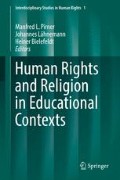Abstract
Muslim states and scholars have had a dual encounter with human rights. On the one hand, it is claimed that Islam is a pioneer religion in offering universal ethics and valuable teachings on the dignity of man, on human rights and, particularly, on the equality of human beings before the law. Thus, the content of the Universal Declaration of Human Rights and other relevant conventions in principal are accepted. On the other hand, creating the new idea of “Islamic human rights” in which the current principles of human rights are governed by the Sharī’a, Muslims spurned the equality in the cases of women and non-Muslims as if they regarded the inequality as a part of their faith. Some Muslims regard the paradigm of human rights as a new means by which Western culture dominates Muslim contexts in a post-colonial modern world.
In this contribution I will offer a solution that stems from Muslim jurists’ literature and language concerning the contradictions between Islam and human rights. This solution has some precedents in jurisprudence in other cases. However, the realization of the solution needs some prerequisite knowledge to lead the jurists as well as Muslim states to accept all doctrines of the human rights concerning the rights of religious minorities. The solution could be applied to other legal subjects which are in conflict with human rights.
Originally published as The Development of Human Rights in Muslim Societies in: M. L. Pirner, J. Lähnemann, H. Bielefeldt (Hrsg.) Menschenrechte und inter-religiöse Bildung, EB-Verlag Dr. Brandt e.K., Berlin 2015.
Access this chapter
Tax calculation will be finalised at checkout
Purchases are for personal use only
Notes
- 1.
It is not necessary to refer to many Arabic and Persian works that have been written on human rights with this view, but, for example, see one of the last ones in: ʽAmmāra (2010), p. 205.
- 2.
For this suggestion, see: Encyclopaedia of the Quran, ed. by Jane Dammen McAuliffe, s. v. ‘Poll Tax’, by Paul L. Heck; also see: Simonsen (1988), esp. 47–61.
- 3.
The conduct of rationalists is a major reason also for accepting single-source accounts of ḥadīth (khabar wāḥid) and indications (amārāt) in Shiite jurisprudence. See concerning the term ‘the conduct of rationalists’, Anṣārī (1419/1998), vol. 1: pp. 346–347, vol. 2: pp. 318–319.
- 4.
The verse 9: 29 of the Qur’an is “Fight against such of those who have been given the Scripture as believe not in Allah nor the Last Day, and forbid not that which Allah hath forbidden by His Messenger, and follow not the Religion of Truth, until they pay the tribute [jizya] readily, being brought low”. Some radical Muslim groups claim that this verse is abrogating those verses that suggest dealing with others in good conduct.
- 5.
Here, I mean by the term ‘utilitarianism’, what is narrated according to John Stuart Mill in Utilitarianism (1861). His version is plausible if not a very defensible ethical theory. See Mill (1969).
- 6.
- 7.
There is a rule in the book of inheritance (kitāb al-farā’iḍ) attributed to the Sixth Imam which indicates that it is lawful for every religionist to obey what is legal in his faith, Al-Ḥurr al-ʽĀmilī (1372/1992), vol. 26: p. 158, no. 4.
- 8.
As regards to this rule in Shiite jurisprudence, see Bujnūrdī (1419/1998), vol. 3: pp. 179–209.
References
ʽAmmāra, M. (2010). haqā'iq wa shubahāt hawl al-simāha al-Islamiyya wa ḥuqūq al-insān [Realities and questions concerning Islamic moderation and human rights]. Cairo: Dār al-Salām.
An-Naʽīm, A. A. (1996). Toward an Islamic reformation. New York: Syracuse University Press.
Anṣārī, M. (1998). Farā’id al-Uṣūl [Five monographs in Islamic legal theory] (Qum: Majmʽ al-Fikr al-Islāmī, 1419/1998).
ʽAṭīyya Muḥammad, J. (2003). Naḥwa Fiqhin Jadīdin li al-Aqallīyāt [Towards new figh for minorities]. Cairo: Dār al-Islām.
Bielefeldt, H. (1995). Muslim voices in the human rights debates. Human Rights Quarterly, 17, 587–617.
Bujnūrdī, S. M. H. (1998). al-Qawāʽid al-Fiqhīyya [Jurisprudential rules] (Qum: al-Hādī, 1419/1998).
Bukhārī, Muhammad b. Ismāʽil. (1401/1981). Saḥīḥ al-Bukhārī. Istanbul, Turkey: Dār al-Ṭibaʽa.
Dalacoura, K. (2007). Islam, liberalism and human rights. New York: I. B. Tauris.
Edalatnejad, S. (2009). Shiite tradition and modernism: The codification of the rights of religious minorities in Iranian laws (PhD dissertation, Berlin, Germany, 2009). Available online at: http://www.diss.fu-berlin.de/diss/receive/FUDISS_thesis_000000012134.
Ḥurr al-ʽĀmilī, Muhammad b. Ḥasan. (1372/1992). Tafṣīlu Wasā’il al-Shīʽa ilā Masā’īl al-Sharīʽa. Qum, Iran: Mu’assasa Āl al-Bayt.
Khānsārī, A. (1405/1983). Jamiʽal-Madārik. Tehran, Iran: Maktaba al-Ṣadūq.
Mill, J. S. (1969). In J. M. Robson (Ed.), Utilitarianism in essays on ethics, religion and society: Vol. 10. Collected works of John Stuart Mill. Toronto: University of Toronto Press.
Rohe, M. (2013). Media legislation in Islamic countries. In M. L. Pirner & J. Laehnemann (Eds.), Media power and religions: The challenge facing intercultural dialogue and learning (pp. 27–38). Frankfurt: Peter Lang.
Sachedina, A. (2001). The Islamic roots of democratic pluralism. New York: Oxford University Press.
Simonsen, J. B. (1988). Studies in the genesis and early development of the caliphal taxation system. Copenhagen.
The Qur’an (original text).
Ṭūsī, Muhammad b. Ḥasan. (1387/1967). al-Mabsūṭ fī Fiqh al-Imamīyya. Tehran, Iran: Maktab al-Murṭaḍawīyya.
Author information
Authors and Affiliations
Corresponding author
Editor information
Editors and Affiliations
Rights and permissions
Copyright information
© 2016 Springer International Publishing Switzerland
About this chapter
Cite this chapter
Edalatnejad, S. (2016). The Development of Human Rights in Muslim Societies. In: Pirner, M., Lähnemann, J., Bielefeldt, H. (eds) Human Rights and Religion in Educational Contexts. Interdisciplinary Studies in Human Rights, vol 1. Springer, Cham. https://doi.org/10.1007/978-3-319-39351-3_9
Download citation
DOI: https://doi.org/10.1007/978-3-319-39351-3_9
Published:
Publisher Name: Springer, Cham
Print ISBN: 978-3-319-39350-6
Online ISBN: 978-3-319-39351-3
eBook Packages: Law and CriminologyLaw and Criminology (R0)

